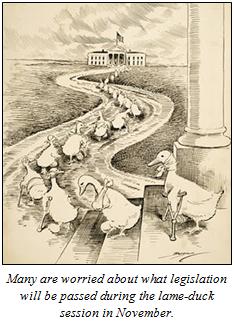By Rebekah Rast
For those who think November 2nd marks the end of this current Congress, think again.
Congress faces a laundry list of items it needs to address before it adjourns to prepare for elections. Most likely, Congress will run out of time. Still on hold are spending bills for the upcoming fiscal year, cap and trade legislation, the small business tax-credit plan, a card-check system (Employee Free Choice Act (EFCA)), and the 2001 and 2003 tax cuts that are about to expire.
The Senate already has released a “lame duck” calendar and it is expected that the House of Representatives will follow suit. Congress will reconvene after the elections to finish up its work. Regardless if any leadership changes take place during the elections, a Democratic Congress will come back into session with the hopes of ramming through its agenda before it’s too late.
“Obama’s White House defines lame duck as the opportunity to pass legislation that is so outrageous that not even the Pelosi-Reid Congress would vote in favor of it before the November election,” says Bill Wilson, president of Americans for Limited Government (ALG).
This has many Republicans worried that Congress will do its best to implement many big-government programs before the new session begins.
One of those programs could be a type of cap-and-trade legislation. Though the House-approved Waxman-Markey bill seemed to lose steam earlier this year, Congress is determined to push some type of energy legislation through both Chambers before year’s end. One such idea is a national energy tax. What would this energy tax legislation include?
If Congress were to push through a bill similar to the House-approved cap-and-tax legislation, it would kill even more American jobs. An analysis by the Heritage Foundation found the following negative consequences to establishing a nation energy tax:
• Net job losses approaching 1.9 million in 2012 and 2.5 million by 2035;
• 1.4 million manufacturing jobs lost by 2035;
• An increased cost of $829 a year for energy utilities for a family of four;
• Gasoline prices would increase 58 percent; and
• Average household electric rates will increase by 90 percent.
Not one of these consequences would help America during a time when she faces an almost 10 percent unemployment rate and stuttering economy.
Also problematic for an unstable nation are the 2001 and 2003 tax cuts set to expire at the end of this year. If Congress does not address these tax cuts, businesses, taxpayers and the economy are left in limbo as to what next year will bring.
Obama is threatening to let the tax cuts expire on many small business people as well as raise the rates on the capital gains and dividends taxes. The uncertainty of what is to come in regards to these taxes is stalling individuals and businesses from making future investments.
To encourage business growth, Obama is pushing the Senate to pass H.R. 5297, the Small Business Jobs and Credit Act of 2010, before year’s end and possibly during the lame duck session. This legislation already passed the House of Representatives in June.
The House Republican Conference states in a report about the bill that it would give the, “Treasury Department $30 billion of taxpayer money and would authorize the Treasury Secretary to use the funds to make capital investments in small banks (less than $10 billion in assets) to ‘increase the availability of credit for small businesses.’”
Even with this legislation’s good intentions, businesses aren’t buying it. They want to know, as well as the rest of the American people, what is going to happen to the 2001 and 2003 expiring tax cuts before any more investing takes place.
Another contentious topic that may show up during a lame-duck session is the Employee Free Choice Act (EFCA), also known as, card-check legislation. This bill takes away employees’ right to vote secretly against unionizing and favors labor unions during negotiations with newly unionized employers. It could also force more employees to enter a union’s underfunded pension plans instead of investing in their own 401k retirement savings plans.
Though Republicans have battled against any heavy legislation being passed during a lame duck session, their pleas have been ignored.
As Senator Tom Harkin (D-Iowa) said, “A lot of things can happen in a lame duck session.”
A new Rasmussen national telephone survey found that 63 percent of polled Americans say Congress should not consider any major new legislation during the two-month lame duck period after the election but should wait for the newly elected members to take office.
With a Democratic Congress that has rammed through a new health care system without the support of most Americans and a complete overhaul of the financial system handing the reins to the federal government, it seems this Congress is the least concerned with what the America people want.
Hopefully the upcoming elections will be enough of a wake-up call and the lame duck session will only take into consideration the work that needs to be done by Congress and not address its personal agenda.
Sen. Harkin is correct, a lot of “things” can happen in a lame-duck session, let’s just hope it is “things” willed by the American people and for the American people.
Rebekah Rast is a contributing editor to Americans for Limited Government (ALG) News Bureau.


